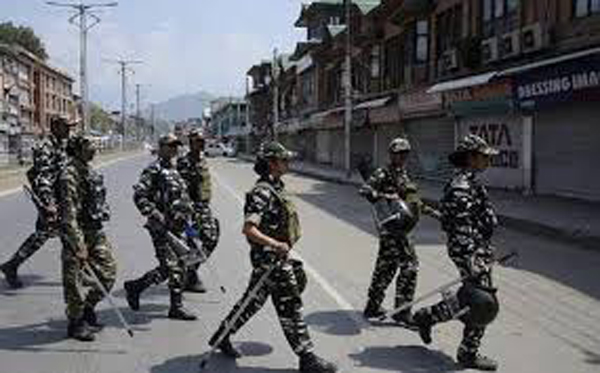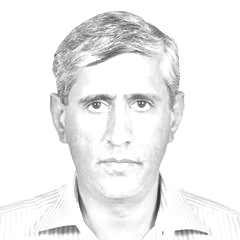Kashmir issue has again been brought to the centre stage by the tyranny of majoritarianism exercised by Modi-led BJP government under the diktat of its ideological driving force i.e the rabidly extremist Hindutva creed of RSS. Kashmir is a bleeding wound that needs to be patched up if any semblance of normalcy is desired in the valley where over 95000 people have died since 1989. The elusive peace between the two nuclear armed neighbours is also hostage to this intractable conflict which refuses to yield to a solution, mainly because of the differences in the perceptions of the three protagonists in the conflict equation. The Kashmiris think they have been denied a right of self determination, the Indians think that they have a right to the state due to the controversial instrument of accession signed by Maharaja Hari Singh in favour of India, and the Pakistanis feel that the UN Security Council Resolutions that constitute the basis of any future resolution of the conflict have been stymied due to Indian obduracy.
Indians invaded the State of Jammu and Kashmir on October 27, 1947 in response to the panic signals by the besieged Maharaja who was facing a rebellion by the Muslim majority districts. The instrument of accession as per Alastair Lamb was not signed when the troops of 1st Sikh regiment were airlifted into Srinagar to secure the airfield under threat from the rebels. When the Indians started pushing into Western Kashmir held by Azad(free) troops of Kashmiri freedom fighters Pakistan Army was also launched to protect its territory by its British CinC Douglas Gracey. The Indians, fearful of an ignominious defeat and loss of state, took the issue to the UN Security Council. The UN Resolutions resulted in a ceasefire and subsequent Karachi Agreement in 1949 to settle for a Ceasefire Line in the State separating areas under Indian occupation and under Pakistan’s control.
On the moral front Kashmiris deserve a consistent and coherent policy of advocacy for their rights from Pakistan
Indian Prime Minister Nehru later reneged on all commitments to conduct a plebiscite in the State on the basis of lame excuses and spurious claims. The Indians meanwhile offered a sop to the wounded sensibilities of Kashmiri leadership in the shape of Article 370 of Indian Constitution that stipulated an autonomous status for the State. That status was also revoked on 5th August 2019. The Indians went on to annex the State by splitting it in two Union territories and appointing two Lieutenant Governors in Ladakh and Jammu and Kashmir Union territories. The Kashmiris’ rights to own property that were guaranteed by the State even as far back as 1922, on the insistence of Kashmiri Brahmins, were trampled through revocation of Article 35A allowing non subject Kashmiris to own property and even cast votes. The gerrymandering of political constituencies was done by allowing voting rights to Indians settlers and redrawing the boundaries of electoral constituencies, an act that was described in the onomatopoeic term of “Modimandering” by the aggrieved kashmiris.
 The constituent assembly of the State of Jammu and Kashmir that had given indemnity to Article 370 and without whose concurrence the article could not be amended had been dissolved in fifties hence the option could not be exercised by any other body. The Indians legally could not abrogate Article 370. They cleverly rendered it inoperative and then went on to introduce new domicile laws in flagrant violation of their own as well as international law. The constant curfew imposed by around 0.8 million Indian security forces for over nine months has resulted in over 1500 detentions and 500 deaths including women and children. A policy of cultural genocide is being imposed on Kashmiris and the world community is looking askance due to the Indian clout and international lobbying. An unfolding human catastrophe cries for a solution in accordance with the UN Resolutions.
The constituent assembly of the State of Jammu and Kashmir that had given indemnity to Article 370 and without whose concurrence the article could not be amended had been dissolved in fifties hence the option could not be exercised by any other body. The Indians legally could not abrogate Article 370. They cleverly rendered it inoperative and then went on to introduce new domicile laws in flagrant violation of their own as well as international law. The constant curfew imposed by around 0.8 million Indian security forces for over nine months has resulted in over 1500 detentions and 500 deaths including women and children. A policy of cultural genocide is being imposed on Kashmiris and the world community is looking askance due to the Indian clout and international lobbying. An unfolding human catastrophe cries for a solution in accordance with the UN Resolutions.
UN Resolutions are in fact the promises of the World community’s conscience to the wounded Kashmiris that have no expiry date either morally or legally. Why is the world community then taking no notice? The reason perhaps is the double standards of morality and the love of lucre. The commercial and strategic interests of the world powers blind them from the imperatives of a moral responsibility. Even the votaries of such moralisms like “Responsibility to Protect” baulk at the prospects of moving the UN Security Council into action when confronted with those realities. What then is the solution? Pakistan has several options to help Kashmir’s cause. After fighting three wars and a localized conflict in Kargil the two countries embarked on a peace quest. Pakistan’s ex foreign minister Khurshid Kasuri has explained the Manmohan-Musharraf Peace Formula which was close to Owen Dixon’s formula centred on trifurcation of the State and conversion of the Srinagar Valley area into an autonomous region while regions with Hindu and Muslim majority under administrative control of the respective countries. The two countries were close to a major diplomatic thaw when Musharraf was unseated and the peace initiative withered on the vine.
After Musharraf’s departure and BJP’s ascension to power in India another factor complicated the equation. The Chinese resurgence as an economic power challenging US supremacy resulted in US pushback in South Asia and a reliance on India as a regional surrogate to do its bidding as a strategic bulwark to China. Pakistan’s economic compulsions to forge an economic linkage with China in the form of CPEC also rankled American sensibilities and any hopes of a diplomatic solution to the issue receded in the background while a new great game ensued in South Asia. Pakistan confronted with an Indian stonewalling of all peace overtures has options of moral and material support to Kashmiris besides a law fare option.
On the moral front Kashmiris deserve a consistent and coherent policy of advocacy for their rights from Pakistan. Pakistan needs to hold a Grand National dialogue to seek consensus on a Kashmir strategy and then its implementation through expert channels. A Kashmir “Government in Exile” needs to be installed in Azad Kashmir and efforts made at UN to delegitimize the Indian occupation by invoking relevant clauses of International Humanitarian Law. The Kashmir Committee of the National Assembly of Pakistan needs to be headed by a Kashmiri and the relevant government ministries like Foreign Affairs should be properly resourced in terms of legal experts to exercise lawfare options effectively. Exercising options to take the case of human rights violations to ICC and ICJ and proving Indian occupation forces’ acts as war crimes also needs to be explored. The placing of the territory under the UN Trusteeship Council that has been suspended since independence of Palau in 1994 also needs to be explored.
Pakistan’s law fare efforts remain frozen in the 1950s era. Pakistan needs to use international law as a tool of foreign policy since India has very cleverly rebranded Kashmir issue as a terrorism issue framing freedom fighters as terrorists taking help of UN Resolutions like 1267 and 1373. We need to be clear that the State of Jammu and Kashmir is in a state of occupation and as per IHL the Indian security forces’ atrocities become war crimes instead of simple human rights violations. We need to collect evidence of war crimes, make a database, and identify individuals who could be tried for those war crimes. After the above spade work even the domestic laws of EU and USA can be invoked to try the war criminals. In many countries the Universal jurisdiction against war crimes is exercised and Pakistan can use that route.
For political and material help Pakistan should leverage Chinese interest in the region to thwart Indian illegal annexation of Kashmir. Meaningful help should be provided to Kashmiri freedom fighters struggling for their basic rights. The UN should be requested to hold a partial plebiscite in the Indian annexed as well as Pakistan controlled areas including Gilgit-Baltistan. The UN Security Council should be asked to ensure a census in Indian Illegally Occupied Jammu and Kashmir (IO J&K) as well in AJK and GB in order to ensure that the demography of the area is clearly understood by the international community. The relevance of five parties to the conflict i.e Kashmiris, Pakistan, India, China and US should be understood and kept in view in any peace making efforts.
The Kashmir issue needs a proactive approach from Pakistan which is only possible when it displays a consistent, coherent and resolute approach to resolve the issue, regardless of the cost entailed.
The writer is a security analyst and a PhD scholar at NUST;e mail rwjanj@hotmail.com
